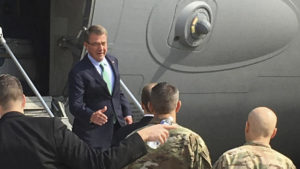by WorldTribune Staff, October 25, 2016
The United States is moving to calm tensions between Iraq and Turkey that were further inflamed on Oct. 23 when Turkish artillery hit Islamic State of Iraq and Levant (ISIL) positions near Mosul.
Baghdad considers Turkey’s presence on its soil a violation of sovereignty and has appealed to the United Nations to compel Turkey to withdraw from Iraq. Iraqi Prime Minister Haider al-Abadi has warned that the standoff risks “triggering a regional war.”

Meanwhile, amid the offensive in Mosul, ISIL on Oct. 24 took full control of the town of Rutba in the western Anbar Province.
Turkey has demanded that it play a role in ousting ISIL from Mosul and has insisted on having a “seat at the table” when it comes to how the city is governed after the terror group is driven out.
Baghdad was further infuriated on Oct. 24 when Turkey’s foreign minister, Mevlut Cavusoglu, told reporters that four Turkish F-16 fighter jets were on standby to provide air support for Kurdish peshmerga forces advancing on Mosul.
Turkey insists its troops are in northern Iraq for only one reason: to prevent Mosul, a traditional Sunni Arab city, from coming under the sway of Shi’ite militias once the city has been retaken from ISIL. President Recep Tayyip Erdogan has emphasized that he won’t stand by and see Mosul controlled by Shi’ites and has adamantly rebuffed Baghdad’s demand to withdraw Turkish forces from northern Iraq.
In one television interview, Erdogan said: “But there is a major question, who will then control the city? Of course, Sunni Arabs, Sunni Turkmen and Sunni Kurds.”
Last week, former U.S. envoy to Iraq Zalmay Khalilzad warned that tensions between Iraq and Turkey risks the “danger of a war within a war that could damage the prospects for retaking and stabilizing Mosul.”
U.S. Defense Secretary Ash Carter said he had brokered the outlines of a deal between the Turks and Iraqis regarding the involvement of Turkish forces in the military offensive, but said the details still needed to be finalized.
“I think there’s agreement there in principle,” Carter told reporters. “Now we’re down to the practicalities of that… and that’s what we’re working through.”
In Rutba, which is home to more than 20,000 people, ISIL on Oct. 24 seized the mayor’s office and captured and executed at least five people – civilians and policemen, according to a report by Al Jazeera.
Rutba is seen as a strategically important town as it controls the road from Baghdad to Jordan and Syria.
Meanwhile, the U.S.-led coalition said it had carried out six air strikes near Mosul on Oct. 23, destroying 19 fighting positions and 17 vehicles, as well as rocket and mortar launchers, artillery and tunnels.
